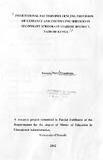| dc.description.abstract | This study explores institutional factors inllucncing provision of effective guidance and counseling services in secondary schools. It was conducted in all the eleven public secondary schools in Starchc District, Nairobi county, Kenya. This research used a self- administered and structured questionnaire to collect primary data. Questionnaires were also used to collect data from the Schools teacher-counselor. Data was computed and processed in numerical and non numerical forms; tabular and percentages. Complementary secondary data from books, journals, official records and newspaper were also used. Results from this research showed that guidance and counseling services offered in secondary schools in Kenya arc influenced by a number of factors including professional qualifications of teacher-counselors, management of
I
students’ record, support from the school management and challenges and constraints facing secondary schools in providing professional guidance and counseling to student among others. The study establishes that the majority of the teacher-counselors were not trained in guidance and counseling. There fore, they did not offer professional guidance and counselling services.
The study established that most secondary school student in starchc District had a negative altitude towards guidance and counselling. These altitudes emerge from students’ lack of confidence in the teacher-counsellors, lack of professionalism in the service and scarcity of time for guidance and counseling. This study has recommended the provision of professional guidance and counselling in secondary schools in Kenya and that all secondary schools should have teacher- counselors appointed on the basis of their qualification and interest in the area. The study also suggests prospective areas for further research work such as a national study on the guidance and counselling programme in all learning institutions.
Further still, the study recommended that the Ministry of Fducation (MoE) should allocate Finances to develop guidance and counseling infrastructure in schools. Guidance and counseling activities should time tabled in schools as part of curriculum. School administrators should team up with guidance and counseling teachers in sensitizing students on the need to seek guidance and counseling services when faced with challenging issues. | en_US |



